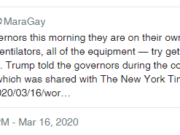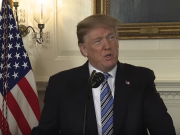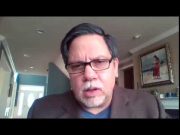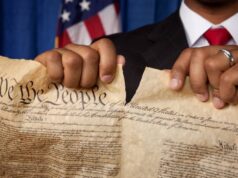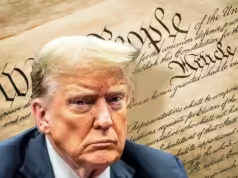Most Americans simply don’t understand the First Amendment or free speech. I have written innumerable pieces on the subject, from Charlie Hebdo to Colin Kaepernick and the Slants. I am a tireless advocate for free speech. I am a consumer of it, I hold it in judgment often, and I grossly over-produce it. I remain frustrated by American ignorance of free speech, and from whom they are free from retaliation for it.
Free speech is the right to express our political views and beliefs free from government persecution or prosecution.
Too many Americans claim “free speech” as the right to say what they want, when they want, how they want, and to be completely free from any repercussions from anyone. That’s not free speech. That’s freedom from consequence and an illegal restraint on the freedom of others.
Free speech has a market, and Americans are free to react to speech based on its value. That free market of ideals and values is the best regulator of free speech.
Your free speech may be countered by firing, protest, shunning, ridicule, and a whole host of other freedoms of expression by fellow Americans who don’t like your speech. It is true you are free to say nearly anything that you want. That is, you are entitled to utter the words. You are not entitled to a consequence free existence for words the market of our civil society can’t stand.
The Supreme Court just re-affirmed, for example, that hate speech is free speech. That’s right. Saying stupid stuff is protected so that no matter how foolish, racist, and ignorant your speech may be, the government can’t do anything about it. The only real limit on free speech of note from your government is when you threaten violence.
Yes, it is true that free speech is, under the law, regulated by time, place, and manner. You are free to leap to your feet and scream “Lock her up” or “Trump is a Racist” … but if you do it at an event to disrupt others, you may be escorted out. It’s not because you don’t have free speech, it’s because your speech is not free in every time and every place.
A civil society is civil because we order liberty, not repress it.
This little cartoon is the best primer for free speech I have seen.
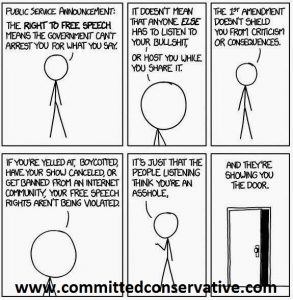
Few people have unfettered free speech. That is, few people can say pretty much whatever they want without fear of a reprisal that can cost them dearly. Billionaires, they can say just about anything if only because they can afford the reprisals.
Retirees can do the same, though outrageous speech could make their retirement miserable if people protest them, dox them, shun them, and humiliate them in the circles and places where they go.
Public reaction isn’t a limit on all free speech. It is a limit on stupid speech. It’s a limit on hate speech. It’s a limit on unpopular speech.
Tenured law professors are another group who enjoy free political speech that is generally consequence free, at least from the perspective of being fired. The shield of academic freedom is a mighty sword of free speech, and it protects stupid speech, hate speech, and crazy speech. In theory, we ought not see or hear much crappy free speech from super-smart people who ought to know best how to speak responsibly.
However, the rise of radicalism and dubious fields of study, together with the reality that institutions of higher learning are now political enclaves, results repeatedly in crappy speech coming out of the academy. If a professor has tenure, then her or she enjoy greater free speech protection than nearly any employee in any industry.
To be fair to the academy, it is often painted with stupid speech by people the media call “professors” who are not traditionally, full professors. If you teach in a college or professional school, you may have a “Professor” title of varying types. Many are simply adjunct faculty. Still others are contract professors working on a term. Your pupils may call you professor, but in the professor class, they don’t see you as equal. And, you don’t have the rights and privileges of tenured faculty.
Often, when crazy pops up on the internet, and it’s a “Professor,” that person is not a tenured scholar working in the field under the protections afforded tenure based upon a long prestigious record of academic scholarship and teaching. There is a stark difference between Milton Friedman and Kevin Allred. As one law school dean famously told me when I was under fire for writing things people didn’t like, “only tenured faculty get to lose their minds.”
A most recent incident involving a visiting Professor at the University of Tampa, a private school, demonstrates the difference between tenured faculty and non-tenured faculty with respect to free speech protections. The professor did not have tenure. He tweeted this:
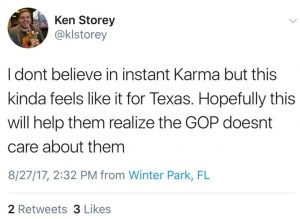
The university fired him. Why? It didn’t want the hassle, the bad publicity, and the protests. It also likely felt the speech hurt its brand, and it did not contribute to meaningful academic dialogue. It was right.
The government can’t do a damn thing to this man, and it can’t do a damn thing about his firing.
That’s because free speech is protected from government action, and the consequences for free speech foibles by the private market enjoy that same protection. You don’t have a Constitutional right to say whatever you want without consequence from fellow citizens.
I saw tweets and op-eds over the past few days by tenured professors suggesting the firing of Mr. Storey was “ridiculous.” It was not. It’s the world in which we non-tenured souls live where reaction to our rants and speech are not restricted or regulated to protect us from consequences. Tenured professors forget sometimes the bubble in which they live.
In fact, if this man’s speech is so important to the tenured class, and indeed so critical to the academy, then hire him on your faculty and give him tenure.
#tenure class is howling & chirping about Tampa non-tenured Prof fired 4 idiotic tweet. Hire & tenure him if he has value. #highered #tcot
— Rich Kelsey (@RichKelsey) August 30, 2017
The tenure class confuses free speech and academic freedom with speech free from consequence. We all have free speech, enshrined in the First Amendment. Tenured professors have free speech protectionism, granted by contract. The truth is, tenure doesn’t enhance free speech … NOT. ONE. BIT. Tenure is an artificial construct that shields a professor from the private and public reaction and consequence of his or her unpopular speech.
Is free speech protectionism a good thing? Maybe. It’s a costly thing!
Society has decided that academic freedom and free speech are essential elements to education for which it is willing to pay the price of free speech protectionism. Tenure, of course, is about more than just protecting a professor’s free speech … but in this instance … free speech protectionism is one of the more obvious manifestations of tenure. The idea of this protectionism is that the value of academic freedom and speech, tied to lifetime employment, are necessary market restraints that will pay off for society. They might pay off. Restraints on the free market speech regulation certainly pays off for the protected tenure class in the short run. That restraint isn’t merely a protection for them, it is a restraint on you effect and power of your free speech.
The cost of these protections for a single class of individuals is part of what I have dubbed, the tenure tax.
Indeed, I have been writing and speaking about the tenure-tax for over two years, and my forthcoming book looks at it from every angle. The tenure-tax is essentially lifetime employment and acknowledged academic inefficiency, the cost of which is found in every tuition bill and student loan in this country. The tax is quite high, and it is worthy of review for its value and return on investment. It is price and tax that tuition payers absorb in our society for protections we give no one else.
Tenure isn’t a government right or Constitutional right … it’s a contractual construct.
Tenure is, however, a universal system in the academy that grants additional protections to speakers that most Americans don’t have. Not every professor has tenure, and it is worth debating whether any should. Preventing an institution from granting it likewise would be a restraint on private contracting.
Those who have earned tenure are mostly elite scholars, and not surprisingly they think consequence free protectionism is good and essential to the academy. It is no wonder that a class of people who enjoy it, and never suffer the consequences and disincentives created by sloppy speech, defend it tooth and nail.
The academy confuses tenure and academic freedom with “free speech.” Tenure is job protection. It’s only relationship to free speech is the assurance that speech won’t get a professor fired. In theory, this enhances dialogue on complicated and controversial issues. That’s true. It also protects stupid, angry, unproductive, and valueless speech that is a by-product of those protections. We are seeing an increase in the latter, and less value from the former. Still, I don’t subscribe to the idea that such protections are not necessary, I merely point out they are past time for review.
Professors, just like you and me, already have free speech. Tenure prevents you and me from regulating their speech.
For the tenure class unhappy about Mr. Storey, rather than taking to the internet to whine about academic freedom, why not investigate the value of the fired professor’s teaching and scholarship? If the education market has a place for him, then he should find a job. After all, faculties run universities and they do the hiring. In the case of Mr. Storey, a leftist, he faces an industry that favors his world view. It’s not like he is a conservative academic.
The best way to judge his speech is to see how the market for his skills reacts to his availability. Does his teaching and scholarship outweigh his stupid speech? We will see.
For all other Americans, the market of listeners regulates our free speech.
When our free speech becomes offensive to employers, friends, foes, and fellow citizens, they are there to regulate our speech in a civil society. When that regulation becomes outrageous, society is there to regulate the regulators.
Should we change that? Moreover, should all professors and instructors have speech protection that holds them free from employment consequences? That would be a tax increase on society, and it would enhance the freedom of one group while restricting the market rights of the rest of us.
I’d be more impressed by the tenure class defense of “Professor” Storey if it were arguing that every American should have consequence free … free speech. That argument is simply too hard to make.
Free speech is the best tool of a free society, and the tool is increasingly useful as the speech sharpens in quality and precision. The best way to produce quality free speech is an unrestrained market to combat crappy speech. Free speech meeting free speech, and the better speech winning in the market, is the best free speech we can offer a civil society.
The government grants you the right to speak. Fellow Americans determine the value of your speech. Sometimes, the judgment is harsh. Speak wisely in the civil society, and you will face little opposition. Speak smartly, and you will enhance society, rather than diminish it. Speak crazy … and you might lose your job, standing, friends, and your reputation … unless you have tenure.
Whatever you do, don’t fall for the myth that you can say anything and suffer nothing for it. The free market of ideas meets your free speech, and that market assigns value. The market can’t be cheated, unless it is restrained or manipulated.
Just like any government restraint on our rights, we should be dubious and skeptical of any group of individuals who seek greater protections for themselves, even by shield of contract in a monopolistic market, at the expense of others. Such protections may not always be wrong, but they are presumptively wrong absent a compelling case that the cost of the tax on our liberty and pocket-book provides a greater value in return. I’d like to see the answer to that equation, preferably with the tenure class showing its work for full credit.
Just remember … Free speech protectionism enhances the speech of one group and diminishes the speech of another group. Your speech is rendered powerless to protect what some consider superior speech. That’s quite a tax.
Author: Richard Kelsey
Richard Kelsey is the Editor-in-Chief of Committed Conservative.
He is a trial Attorney and author of a #11 best-selling book on Amazon written on higher education, “Of Serfs and Lords: Why College Tuition is Creating a Debtor Class”
Rich is also the author of the new Murder-Mystery series, “The ABC’s of Murder,” book one is titled, “Adultery.”
Rich is a former Assistant Law School Dean and Law Professor. At Mason Law Kelsey conceived of, planned, and brought to fruition Mason’s Center for the Protection of Intellectual Property, known as CPIP, drawing on his expertise as a former CEO of a technology company specializing in combating cyber-fraud.
In 2014 he was elected by the graduating class as the faculty speaker at their graduation.
He is a regular commentator on legal and political issues in print, radio and on TV. Rich has appeared on hundreds of stations as a legal expert or political commentator. He provided the legal analysis for all stages of the Bob McDonnell trial and appeal for numerous outlets including NPR and WMAL.
Rich also writes on occasion for the American Spectator and CNSNews.com.
In his free time, Rich is part of the baseball mafia of Northern Virginia, serving on numerous boards and as a little league and travel baseball coach.
His Twitter handle is @richkelsey.









